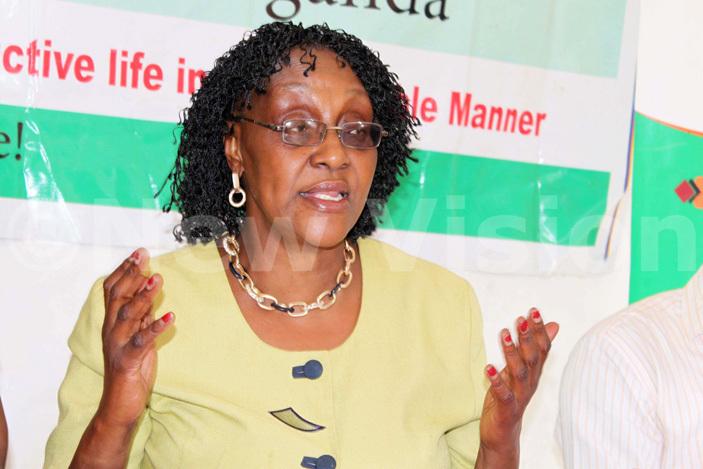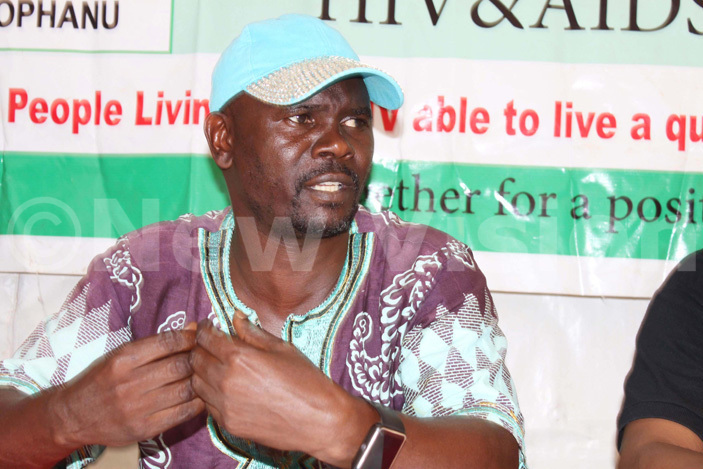People living with HIV advocate for increased TB financing
“ We require 136 billion shillings or 38 million US dollars annualy to manage TB in this country. Our government is only investing 5.4 billion shillings or 1.5 million US dollars out of the total (136 billion which is only 4%). The rest is either a funding gap or covered by the development partners,”
As Uganda joins the rest of the world to commemoratw World TB Day, People Living with HIV, under their umberella organisation, the National Forum of People Living with HIV& AIDS Networks in Uganda (NAFOPHANU), have called for increased TB financing, saying Government's contribution of barely 4% in fighting TB is deplorably low.
" We require 136 billion shillings or 38 million US dollars annualy to manage TB in this country. Our government is only investing 5.4 billion shillings or 1.5 million US dollars out of the total (136 billion which is only 4%). The rest is either a funding gap or covered by the development partners," revealed Dr. Lydia Mungherera.
She added that the development partners all together (Global Fund, USAID etc) bring in 70%, then 4% government of Uganda creating 26% gap which is underfunded. "Right now we still have partners who are willing to spend money on TB but suppose they stop?" she wondered.
At a World TB Day press conference held at NAFOPHANU offices in Mengo on Wednesday, activist said that worldwide, TB is now the third leading cause of death among women aged 15-44 years and the greatest single infectious cause of death in young women. TB is also the leading killer of people living with HIV (PLWH), among other disease.
" We are depending on development partners to fight TB but what do we do if they stop funding us? Donors are only interested in some specific areas, for example, they don't want to spend money on human resourses yet is is human resource that gets work done, " said Robert Nakibumba, a TB actvist.
Nakibumba noticed that it is difficult to get work done without human resource and those are some of the reasons we think that the work is not being done, because we do not have the people. With the theme "Unite to End TB," Mungherera said that though it is the responsibility of government to care for its people, all of us should unite to end TB.
She said that we should do what we did with HIV/AIDS, to demedicalize TB and mobilize ourselves and our people in our communities and talk about TB and provide information about the signs and symptoms of the disease.
Dr. Stephen Watiti said that the prevalence of TB in Uganda has increased from a previous estimate of 159/100,000 population to 253/100,000. Uganda has more 40,000 new TB patients each year, which is far higher than previously estimated.
It is estimated that 2/3 (two out of every three people) in Uganda are infected with TB. Out of the 23 million people estimated the have TB germs, 100,000 (One hundred thousand) develop the TB infection with signs and symptoms every year. Out of the 100,000 people, 45% or 45,000 (forty five thousand) are co-infected with HIV and out of the 45% of the TB patients 10 -17% are children below 15 years. 6% or 6,000 (six thousand) of the TB patients die each year. TB continues to kill 3 people every passing minute.
 Dr. Lydia Mungerera speaking during the Word TB Day conference.
Dr. Lydia Mungerera speaking during the Word TB Day conference.
People living with HIV said that while as they appreciate the efforts of government to end TB, but they also acknowledge some hindrances to total TB elimination which include: Sporadic stock outs of TB medicines, preventive therapy like isoniazid and laboratory reagents needed to diagnose the disease and inadequate facilities for Multi Drug Resistant (MDR) patients. There is urgent need to address the issue of Domestic Health Financing if TB is to be eliminated.
Their Appeal:
1) Our Government still relies heavily on donors to fight TB. The government is only investing 4% (5.4Bn UGX) out of the total (136 Bn(UGX) required to fight TB
2) Lack of an adequate financing for TB programs leads to stock out of TB drugs and as a result, adherence to treatment becomes a big challenge amongst the TB patients. This has resulted to limited community awareness hindered use of community recourses for early case detection.
3) Lack of sufficient funds also affects the Human resources. There is no specific cadre trained to manage TB and as such there are limited trained healthcare professionals to support the areas of great need.
4) Rise of MDR-TB (Multi-Drug Resistant TB) - a strain resistant to isoniazid and rifampicin, the two most effective anti-TB drugs. In addition, X-MDR-TB (Extensive Multi Drug Resistance-TB) cases are emerging. This is very difficult to treat and costs a lot of money approx. 10,740,000 UGX (USD 3000) for buying the drugs per patient.
5) "TB/HIV co-infection is estimated at 45,000 patients and it is because of this high co-infection rate that diagnosis and treatment of TB in people living with HIV is essential to reduce unnecessary deaths of people with HIV" Said Dr. Paul Isiko, Mulago Hospital.
To further address the challenges faced in the elimination of TB, Dr. Watiti says that government should ensure commodity security. He says that there should be urgent investments in infrastructure, diagnostics and provision of care, and also ensuring that medicines are available.
"Case detection through quality-assured bacteriology by strengthening TB laboratories, Gene-xpert machines , which is a new test for TB that can find out if the person is infected or if the bacterium of the person has resistance to one of the common TB drugs," Said Dr. Watit.
 Moses Nsubuga, popularly known as Supercharger, who has lived with HIV for over 15 years, speaking during the World TB Day press conference at NAFOPHANU offices.
Moses Nsubuga, popularly known as Supercharger, who has lived with HIV for over 15 years, speaking during the World TB Day press conference at NAFOPHANU offices.
Stella Kentutsi, executive director, NAFOPHANU, said that it is possible to end TB if government puts in place an enabling environment - where health centers do not run out of stocks, are fully equipped to diagnose the disease and the human resources are available to care for the patients.
Nakibumba observed that the Government should ensure that adequate numbers of trained healthcare professionals are supported to work in the areas of greatest need. There should be standardized treatment, which should entail supervision and patient support as well as community-patient involvement. This is where recruitment of Community Health Extension Workers (CHEWs) will be vital"
Types of TB
Active TB disease—an illness in which TB bacteria multiply and attack different parts of the body, causing symptoms such as cough , fever, weight loss, and night sweats.
Latent TB infection—a condition in which TB bacteria is alive but inactive in the body. People with Latent TB infection have no symptoms, do not feel sick, cannot spread TB to others, and usually have a positive skin test reaction. They may develop active TB disease if their immune system is weakened and/or they do not receive treatment for latent TB infection.
Pulmonary TB---active TB disease that occurs in the lungs, usually producing a cough that lasts 2-3 weeks or longer. According to Dr. Mabumba, most active TB disease is pulmonary and it is the commonest (TB of the lungs) and it is the one which is transmitted and should worry everybody.
The other type is Extrapulmonary TB—active TB diseases in any part of the body other than the lungs, such as the kidney, spine, brain, or lymph nodes.
People who are co-infected with TB/HIV face a higher risk of severe illness and death as a result of the infection between the two diseases.
Mabumba, however says that TB is curable so long as you take drugs in the proper doses and you do not default, whether you have cancer, diabetes, HIV or any other condition.